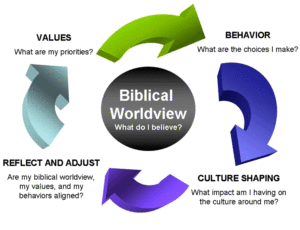Some say we should just ‘Coexist;’ live and let live, that all religions lead to the same place. But they can’t all be true… can they? It’s possible all religions could be false, but they cannot all be true! Since our worldview directly impacts how we live, we should at least consider why we believe what we believe. After all, our eternity is at stake.
And just as it is appointed for man to die once, and after that comes judgment,28 so Christ, having been offered once to bear the sins of many, will appear a second time, not to deal with sin but to save those who are eagerly waiting for him.Hebrews 9:27-28
Unlike Christianity, many cults and world religions claim human beings can work, control, or at least contribute to their eternal destiny, but the Bible teaches that Jesus is the only name under heaven by which we can be saved (Acts 4:12). No one else in history except Jesus Christ ever claimed to be God, the divine Savior through whom we are saved.
By being the perfect sacrifice for our sins, His offer of grace and forgiveness is profoundly unique. But isn’t it intolerant to declare there’s one God, one Savior, one true religion, and one Lord Jesus Christ – the only path to eternal life? Not if everything Jesus said was the truth!
Some folks don’t like the fact that Truth is quite exclusive. And the claims of Jesus being the Way to salvation, the Truth, and the Life seem so narrow. But what if He is right? Everything hinges on who Jesus is, and our eternal destination depends on what we believe about Him. Is He a liar, a lunatic, a legend, or Lord of all?
Through Scripture, we see life from a biblical standpoint. And Christianity provides compelling answers to four ultimate questions of origin, meaning, morality, and destiny.
1. Where do the universe and human beings come from? (origin)
2. What is the meaning or purpose of life? (meaning)
3. How do we know what is right and what is wrong? (morality)
4. What happens to us after we die? (destiny)
The Bible has answers for any question or problem in life. Its teachings are logically consistent, they accurately describe reality as it is, and they speak directly to the human condition.
A Christian worldview includes the following teachings:
God has always existed, moral absolutes exist; the source of truth is the Bible which is inspired and accurate in the principles it teaches; salvation is by grace alone through faith in Jesus Christ who pre-existed with the Father and the Holy Spirit, was born of a virgin, lived a sinless life on earth, died on the cross and was resurrected three days later, and stayed here for forty more days before He ascended to the right hand of the Father; believers have a duty to witness; Satan is real; Heaven and Hell are actual places, God is the sovereign, all-powerful maker of the universe, and Christ will return one day to judge mankind.

Many have asked, “But is the Bible reliable?”
After thousands of years of constant attacks, opposition, and intense scrutiny by critics − warfare that no other work has ever seen − the Bible has withstood the onslaught, has gained credibility, and the Christian faith has continued to thrive throughout the world. Why?
No other written work has the power to convict people of their sin, the ability to change human nature, and offers a permanent solution to man’s greatest problem.
Consider the uniqueness of the Bible: a record of God’s message to His creation, miracles, history, an honest assessment of evil and the heart of man, unique claims, a plan of salvation, and a specific description and vision of the end times.
Others have asked, ‘but if it’s true, then why don’t more people live like it?’ Fair question!
Just because Christianity is not as popular in America as it once was does not mean God has changed or the Bible isn’t true. It means we are living in an ever-changing society in which feelings trump facts. But Jesus said:
“Heaven and earth will pass away, but my words will not pass away.” (Luke 21:33)
He made this statement over 2,000 years ago, and today His words remain indisputable. The Bible is the best-selling book of all time, the most cherished as well as the most hated, and from Genesis to Revelation the story of human redemption unfolds.
In other evidence to consider, Jesus Christ fulfilled hundreds of prophecies. The odds of anyone fulfilling this amount of prophecy are staggering. For example, one person fulfilling only 8 prophecies equates to one chance in ten to the 17th power. (1 chance in 100,000,000,000,000,000)
In fact, the central purpose of prophecy is to reveal the one true God and confirm the truth of Scripture. According to Bible scholars,
- 1,845 references point to the return of Jesus Christ
- More than a quarter of the Bible is prophecy (some suggest one third)
- Jesus’s return is highlighted in seventeen Old Testament books, as well as 321 mentions in the New Testament.
- The “God-breathed” sixty-six books in the Bible were written by forty different authors from diverse backgrounds
- Scriptures were written in three different languages over a period of 1,500 years on three different continents by men who never communicated with each other!
Archaeology confirms the Bible, hundreds of eye-witnesses testify to it, history supports it, martyrs died for it, and prophecy reinforces its truth.
Theologian, John Ankerberg stated:
“If the Bible is the inerrant Word of God, and if it authoritatively answers the fundamental questions of life, then who can logically be passive and ignore its teachings? If the Bible accurately tells us who God is, who we are, why we are here, and what happens when we die, is there a living soul anywhere who should fail to be impressed?
If you really want to understand truth, it is revealed throughout Scripture; and Jesus said the truth will set you free! There are consequences – in this life and the next – for denying Christ and rejecting God’s offer of salvation.
“If you confess with your mouth Jesus as Lord, and believe in your heart that God raised Him from the dead, you will be saved; and… “Whoever will call on the name of the Lord will be saved.” (Rom. 10:9, 13)
We could only briefly touch on it here, but with all the evidence and history available, we can confidently trust in God, conclude that the Scriptures are reliable, and depend on His word – even if our culture is heading in the opposite direction.

